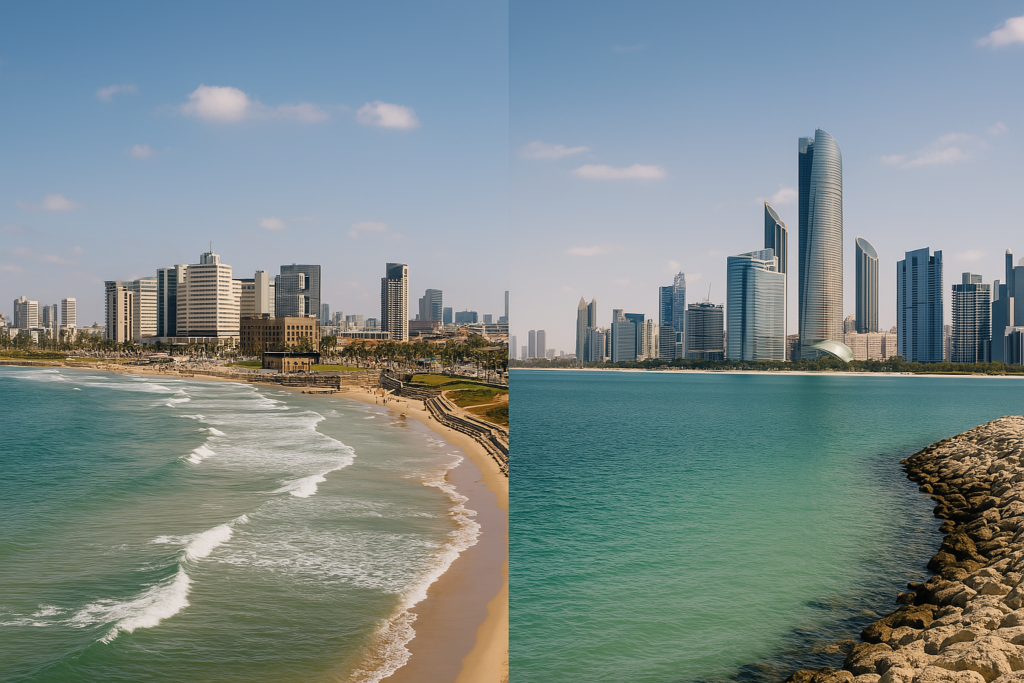By Yasser Bassam
Trade deals don’t build trust. People do.
One peacebuilder shares how tradition, empathy, and Gen Z are transforming the meaning of peace in the Middle East.
I was born in Al Ain, a city cradled by sand dunes and date palms, where tradition is not a word—it’s a way of life. In the stillness of its afternoons, among the rhythms of prayer calls and the quiet pride of a tight-knit community, I learned values that have stayed with me ever since: respect, humility, and the importance of peace.
Now, at 25, I carry those values not only as a son of Al Ain, but as a doctor and entrepreneur. In both healing and building, I’ve learned that peace isn’t just an ideal—it’s a daily necessity. Whether I’m treating patients or launching new ventures, I’ve come to see that real progress means little if it doesn’t leave room for compassion, connection, and mutual understanding.
That same belief led me to join The Abraham Bridge Initiative (TABI)—a project rooted in the very values I grew up with. In partnership with Reichman University, The Raphael Recanati International School, and the Shimon Peres Fellowship, TABI brings together young leaders from across the Abraham Accords nations to build bridges where there were once walls. Through student-led research, cultural exchange, and honest dialogue, we’re working to make peace tangible—something you can experience, not just read about. For me, TABI isn’t just a program. It’s a continuation of everything Al Ain taught me: that true change starts with human connection.
This work is new. The calling isn’t.
From as early as I can remember, peace wasn’t just something I hoped for—it was something I felt responsible for. Not because I was told to, but because it felt like a calling. In a world splintered by conflict, I’ve always believed peace is the only worthy path. It’s not easy. It’s not quick. But it’s worth everything.
When the Abraham Accords were signed in 2020, something shifted—not just in geopolitics, but inside me. Suddenly, ideas that once felt impossible started taking shape. Tel Aviv and Abu Dhabi, two cities that once lived in separate mental worlds, were suddenly a short flight apart. Borders that had been drawn in suspicion now cracked open to possibility.
But for someone like me, who has spent a lifetime committed to building peace quietly, person by person, the real impact wasn’t in trade deals or handshakes on a stage. It was in the smaller moments: a message from a Jewish friend in Tel Aviv saying “we have more in common than we thought,” or a video of an Emirati and an Israeli sitting in a café in Jaffa, laughing over coffee and hummus.
This is what real peace looks like—not the ceremonial kind, but the human kind.
I’ve spent years fostering these small bridges—connecting youth across cultures, encouraging dialogue between people who were taught to see each other only as “other.” I’ve seen how a conversation can soften a heart. I’ve seen how a shared project can unravel decades of distrust. I’ve seen how people can transform when they realize their identity doesn’t have to be defined by division.
And now, more than ever, young people are taking that torch and running with it.
The Abraham Accords opened a window, but it’s the younger generation—born into a world of hyper-connectivity and digital platforms—who are stepping through. They’re turning TikTok into a space for cross-cultural storytelling. They’re debating tough topics in livestreams. They’re posting selfies with people their parents never imagined meeting. Some of it is idealistic. Some of it is messy. All of it is necessary.
Of course, not everyone is ready. The shadow of the Israeli-Palestinian conflict still looms large. Public skepticism in many Arab countries remains deep. And peace, if rushed or oversimplified, risks becoming fragile.
But that’s why we need to go deeper.
We need peace that can withstand criticism, that leaves space for grief, and that refuses to ignore the hard conversations. We need peace that doesn’t ask us to forget, but invites us to imagine. We need peace that is built—not announced.
And for that, we need more than diplomats.
We need listeners. Connectors. Dreamers. Bridge-builders.
We need people like the students forming new friendships at seminars in Abu Dhabi. Like the Moroccan youth rediscovering their country’s Jewish roots. Like the young Israelis who dare to ask, “What does justice look like for everyone in this region?” We need the quiet efforts, the invisible labor, the long conversations that never make headlines.
We need each other.
I come from one of the most traditional cities in the Gulf. And I carry that tradition with pride. But I also carry a belief that tradition and peace are not opposites. In fact, real peace honors tradition by making space for every voice at the table.
So I keep building.
Not with blueprints or treaties—but with trust, and time, and the belief that even in a region long divided, peace is not a myth. It’s a practice.
And I intend to keep practicing it—for as long as I live.



